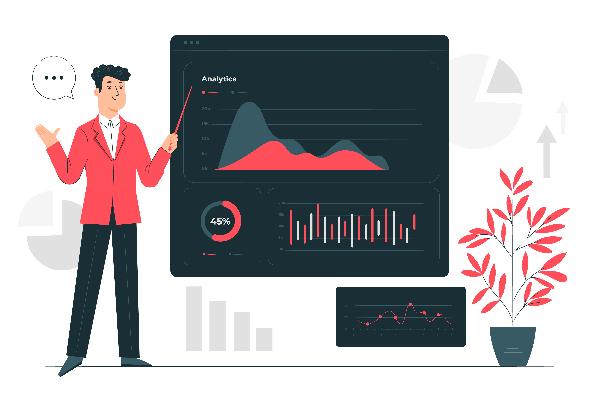Server less Computing with AWS Lambda: Unleashing the Future of Scalable and Cost-Effective Data Workflows

Table of Contents:
1. Introduction: Rise of Serverless Computing and AWS Lambda
2. Understanding Serverless Computing: Key Concepts and Benefits
3. AWS Lambda: Detailed Insight into the Service
4. How to design a Serverless Data Workflow Using AWS Lambda
5. Integrating Lambda with Other AWS Services—Powerful Data Pipelines
6. Optimising Lambda Functions for Performance and Cost-Efficiency
7. Monitoring and Troubleshooting Serverless Applications
8. Can Professional Certificates in Data Science help in Mastering Serverless Computing?
9. Serverless Environments and Security
10. Migration from Traditional Server-Based Architectures to Serverless
11. Case Studies: Successful Serverless Data Workflows in Real-World
12. Conclusion: The Future of Data Science in a Serverless World
Introduction: Rise of Serverless Computing and AWS Lambda
In the rapidly changing landscape of data science and cloud computing, a new paradigm has recently made its way into mainstream services, reinventing how we design and deploy data workflows: serverless computing. Abstraction from the underlying infrastructure takes developers back to what really matters—the code. It gives data scientists and engineers the power to build cost-effective, highly available, and highly scalable data pipelines without precedent in terms of the ease and efficiency that this new generation of serverless platforms provided by AWS Lambda allows.
With the demand for real-time data processing and analysis, interest in serverless computing has grown multifold, and adoption goes on with different organizations across industries empowered by services such as AWS Lambda. This detailed guide will take a closer look at key concepts and advantages of serverless computing, give a deeper insight into the features and capabilities of AWS Lambda, and cover reasons why professional certificates in data science are important for mastering this cutting-edge technology.
Getting Familiar with Serverless Computing: Core Concepts and Advantages
At its core, serverless computing is a cloud-native architecture in which a developer can build and run applications without worrying about managing or provisioning servers. With abstraction of the infrastructure layer, serverless platforms such as AWS Lambda allow a developer to focus only on code, stripping operational overhead and efficiently using resources for operation.
Key benefits to serverless computing include:
• Self-managing, auto-scaling, high-availability
• Variable workloads—on-demand pricing model
• Easy deployment and management
• Less operational overhead; less maintenance of servers
This will enable data scientists and engineers to make more agile, scaled, cost-effective data workflows, which are going to yield business value and innovation.
AWS Lambda: Deep Dive into Service
AWS Lambda is a serverless computing service offered by Amazon Web Services that allows running code in response to a great many triggers, be they HTTP requests, database events, or scheduled events. Using Lambda, teams and developers build and deploy code without having to maintain servers, an operating system, or runtime environments.
It supports a wide array of programming languages—think Python, Java, Node.js, and Go. Therefore, this will be most useful for data scientists or engineers who handle huge varieties of tasks in data processing and analysis. Using Lambda's event-driven architecture and automatic scaling, one is able to architect very scalable and resilient data workflows that dynamically respond to workload and processing demands changes.
Designing Serverless Data Workflows with AWS Lambda
Designed for effective serverless data workflows with AWS Lambda, the service requires in-depth knowledge of its capabilities and best practices. This reaches from defining event sources and triggers to the optimization of function performance and cost efficiency—things a data scientist or engineer should bear in mind while building serverless data pipelines.
A professional certificate in data science could give the required amount of insights and hands-on in designing and implementing serverless data workflows using AWS Lambda. To explain, these programs convey quite meaningful knowledge and skills that professionals in data would need to build cutting-edge, serverless-powered data solutions, from event-driven architecture to data streaming and serverless data processing.
Integrate Lambda with Other AWS Services for Powerful Data Pipelines
One of the strongest features of AWS Lambda is its tight integration with other AWS services, making it quite easy for data scientists and engineers to construct out-of-the-box, end-to-end data pipelines but very potent, leveraging the uniquely outstanding abilities of each. Doing this, the possibilities of constructing sophisticated data workflows are nearly endless—from ingestion and processing to transformation via AWS Lambda, with data results stored in Amazon Redshift or Amazon DynamoDB.
In learning how to integrate Lambda with other AWS services, data professionals will unlock new levels of efficiency, scalability, and cost-effectiveness for their data processing and analytical tasks. It means that these integration patterns and best practices are normally included in professional certificates of data science; therefore, students who wish to design and implement complex, serverless-powered data pipelines are equipped with theoretical knowledge and hands-on experience.
Optimizing Lambda Functions for Performance and Cost-Effectiveness
Even if serverless computing entails a number of evident advantages in terms of simple scalability and ease of use, data professionals should have an idea of how to tune Lambda functions for performance and efficiency. Be aware that such changes, like memory allocated, execution time, and concurrency, can impact not only the performance of Lambda Functions but also their pricing, and all these parameters are to be properly monitored and adjusted in relation to different workload requirements.
The reason is that professional certificates in Data Science will often have modules on the optimization of Lambda functions, leading practices about memory management, code optimization, and cost control strategies. Equipped with these techniques, data professionals can ensure that their serverless data workflows are not only highly performant but also cost-effective delivering maximum value to their organizations.
Monitoring and Troubleshooting Serverless Applications
As with any complex system, monitoring and troubleshooting are essential to the reliability and performance of serverless applications designed using AWS Lambda. Lambda supports monitorability and logging through Amazon Cloud Watch and enables the traceability of major metrics like invocation count, duration, and errors, and lets one set up alarms and notifications against predefined thresholds.
Professional certificates in Data Science often require the study of the basis of monitoring and troubleshooting serverless applications, so that students are equipped with the ability to identify and fix problems in their Lambda-powered data workflows. With the knowledge of how to tap into CloudWatch and other AWS monitoring tools, data professionals can be certain that their serverless applications are running smoothly and can return disingenuous results.
The Role of Professional Certificates in Data Science: Mastering Serverless Computing
Professional certificates can facilitate aspiring and professional data scientists to surge ahead of others within a fast-moving world of cloud computing and data engineering. This would, therefore, turn out to be the best route for gaining experience in serverless computing using AWS Lambda. These programs will extend the learning of serverless computing, both theoretically and in terms of practical applications, including domain nuances, thus enabling students to design, develop, and optimize serverless data workflows.
Professional certificates in Data Science provide a learning continuum through immersion into the lectures, hands-on exercises, and case studies in real applications for studying AWS Lambda and understanding its place within modern data architecture. It underscores student confidence and competence to move freely in this complex, fast-moving world of serverless computing with meaningful delivery of value to respective organizations on exposure to leading-edge research, industry insights, and mentorship by the best minds in this field.
Security Considerations in Serverless Environments
Despite the benefits provided by serverless computing regarding scalability and ease of use, data professionals must be cautious about associated security considerations. From access management and permissions to handling sensitive data in a secure environment, here are some best security practices that need to be taken care of while developing serverless applications with AWS Lambda.
Professional certificates in data science, mostly, will contain modules on serverless security that cover IAM roles, encryptions, and compliance requirements. By understanding the security considerations and how best practice in these areas can be implemented, data professionals are well on their way to ensuring that their serverless data workflows are performant, cost-effective, secure, and compliant.
From Traditional Server-based Architectures to Serverless
For those organizations that traditionally based their data processing and analyses on more conventional server-based architectures, the move to serverless computing using AWS Lambda is not a small initiative. This requires proper planning and execution for the migration process to be smooth—from re-architecting existing applications at the beginning to the very end, where teams have to be trained and upskilled in new technologies.
It is also possible for professional certificates in data science to provide invaluable guidance and support for making the organizational move to serverless computing. Courses at these levels address best practices in migration planning, application re-architecture, and team upskilling, therefore helping data professionals surmount the challenges of shifting to serverless, so that it can realize all its transformational potential.
Real-World Case Studies: Successful Serverless Data Workflows
Show more practical applications and other benefits of serverless computing using AWS Lambda through real-world case studies and examples of successful serverless data workflows. From data processing pipeline optimization and cost reduction to enabling real-time analytics and event-driven architectures, examples range across the board of organizations harnessing the power of serverless computing in further innovation and offering better service delivery to their consumers.
Case studies are a part of professional certificates in data science. Students can get valuable insights into the challenges, general practices, and lessons learned from various organizations which have used serverless data workflows to great success. One can realize valuable insight and inspiration for one's own serverless projects and initiatives by studying such examples.
Conclusion: The Future of Data Science in a Serverless World
In a world where data processing and analysis require more scalable, cost-effective, and highly available solutions, serverless computing with AWS Lambda is likely to only further accelerate, eventually changing the way data professionals architect and deploy data workflows today. Serverless platforms like Lambda abstract away the underlying infrastructure and let developers deal with only code, allowing data scientists and engineers to build cutting-edge, event-driven data pipelines that are core drivers of business value and innovation.
For aspiring and veteran data professionals who strive to stay relevant in the rapidly changing environment, professional certificates in data science could show the way to learning serverless computing and ontology development techniques that set any position on a path of success in the data-driven economy. Equipped with proper theoretical instruction, hands-on experience, and case studies within companies, these programs would put students in a position to amass knowledge, skills, and mindset towards leveraging serverless computing in the quest to deliver major changes in organizational data solutions.
In the rapidly unfolding future of data science, being able to effectively lever serverless computing will mean the difference in success for a data professional innovative in value creation within an increasingly competitive and data-driven world. By embracing AWS Lambda and all that serverless computing stands for, data professionals can unleash new frontiers of data processing and analysis in a way that shapes the future of the data science field and drives progress across industries.
Note: IndiBlogHub features both user-submitted and editorial content. We do not verify third-party contributions. Read our Disclaimer and Privacy Policyfor details.







